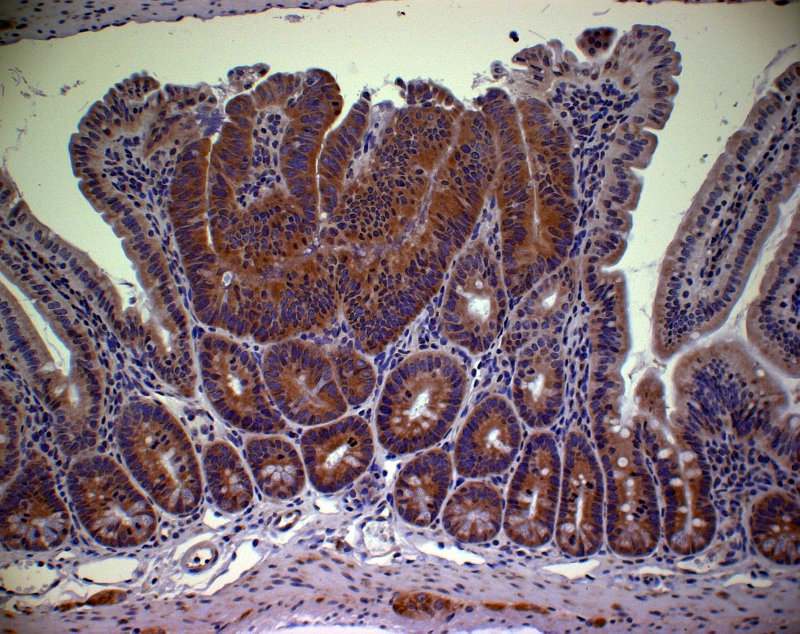Researchers discover genes involved in colorectal cancer

A study published today used the Sleeping Beauty transposon system to profile the repertoire of genes that can drive colorectal cancer, identifying many more than previously thought. Around one third of these genes are mutated in human cancer, which provides strong evidence that they are driver mutations in human tumours.
The collaborative project, funded principally by Cancer Research UK and the Wellcome Trust, was led by Dr David Adams from the Wellcome Trust Sanger Institute, and Dr Douglas Winton, of the Cancer Research-UK Cambridge Research Institute.
“These findings, when combined with mutation data from human colon cancers, will drive forward our understanding of the processes that lead to colorectal cancer. They demonstrate how many genes can contribute to this cancer and how these genes work together in the development of this disease.”
Dr David Adams Senior author from the Wellcome Trust Sanger Institute
The Sleeping Beauty transposon system induces genetic mutations at random, identifying and tagging candidate cancer genes, the drivers that cause colorectal cancer. This system has become critical in uncovering the genetic pathways that cause cancer, and, in this study, the team identify more than 200 genes that can be disrupted in human colorectal cancers.
Colorectal (bowel) cancer is the third most common cancer in the UK, and the second most common cause of cancer deaths after lung cancer; just under 40,000 people were diagnosed with bowel cancer in the UK in 2008 – around 110 people every day – a figure which has shown little improvement over the last decade.
“Our research provides a rich source of candidate genes that represent potential diagnostic, prognostic and therapeutic targets, and defines the breadth of genes that can contribute to cancer of the intestine. It is becoming increasingly clear that cancers are driven by mutations in disparate collections of genes and it is essential that we tease apart the important changes.”
Dr Douglas Winton Senior author from the Cancer Research UK Cambridge Research Institute
Current thinking is that perhaps around 5-20 major drivers are mutated in any one cancer cell, but the number and identity of all of the cancer drivers, and how many drivers are found in each type of cancer, is largely unknown. By performing screens for cancer genes in the mouse and by then comparing them to data from human tumours the team identified a rich catalogue of new candidate genes helping to refine the genes that genetic pathways that drive bowel cancer development.
The research complements studies by The Cancer Genome Atlas and the International Cancer Genome Consortium, which are cataloguing the mutations responsible for cancer development using next generation DNA sequencing.
“At its heart, cancer is a disease driven by faulty genes. Research suggests that each cancer cell has a number of ‘driver’ faults that make them grow out of control, as well as ‘passenger’ faults that they pick up as the disease develops. This technique is helping us to tease out the key drivers of bowel cancer, laying the foundations for more effective, targeted treatments for the disease in the future.”
Dr Lesley Walker Director of cancer information at Cancer Research UK
More information
Funding
This work was funded by Cancer Research UK, the Wellcome Trust, the Kay Kendall Leukemia Fund, the NWO Genomics program and the Netherlands Genomics Initiative.
Participating Centres
- Cancer Research-UK Cambridge Research Institute, Li Ka Shing Centre, Cambridge, UK
- Experimental Cancer Genetics, Wellcome Trust Sanger Institute, Hinxton, Cambridge, UK
- Histopathology Unit, London Research Institute, Cancer Research UK, London, UK
- Netherlands Cancer Institute, Amsterdam, the Netherlands
- Delft Bioinformatics Laboratory, Delft University of Technology, Delft, the Netherlands
- Department of Pathology, University of Cambridge, Addenbrooke’s Hospital, Hills Road, Cambridge, UK
Publications:
Selected websites
About Cancer Research UK
- Cancer Research UK is the world’s leading cancer charity dedicated to saving lives through research.
- The charity’s groundbreaking work into the prevention, diagnosis and treatment of cancer has helped save millions of lives. This work is funded entirely by the public.
- Cancer Research UK has been at the heart of the progress that has already seen survival rates double in the last forty years.
- Cancer Research UK supports research into all aspects of cancer through the work of over 4,000 scientists, doctors and nurses.
- Together with its partners and supporters, Cancer Research UK’s vision is to beat cancer.
For further information about Cancer Research UK’s work or to find out how to support the charity, please call 020 7121 6699 or visit www.cancerresearchuk.org
The Wellcome Trust Sanger Institute
The Wellcome Trust Sanger Institute is one of the world’s leading genome centres. Through its ability to conduct research at scale, it is able to engage in bold and long-term exploratory projects that are designed to influence and empower medical science globally. Institute research findings, generated through its own research programmes and through its leading role in international consortia, are being used to develop new diagnostics and treatments for human disease.
The Wellcome Trust
The Wellcome Trust is a global charitable foundation dedicated to achieving extraordinary improvements in human and animal health. We support the brightest minds in biomedical research and the medical humanities. Our breadth of support includes public engagement, education and the application of research to improve health. We are independent of both political and commercial interests.


